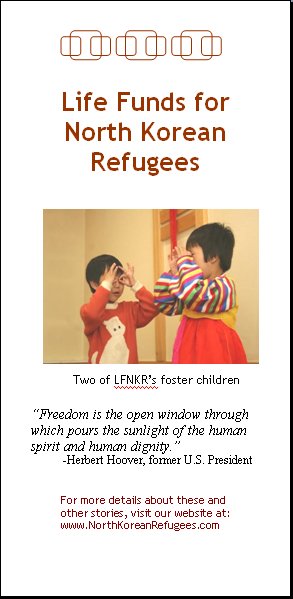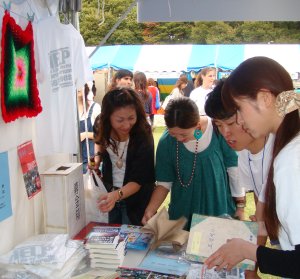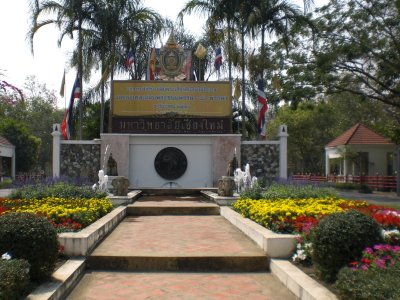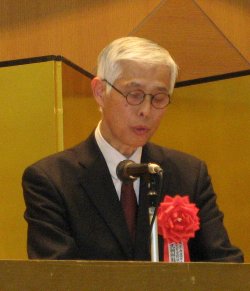Seminar on Refugees & Human Rights to Be Held in Tokyo
Agenda for Tokyo Seminar
| 13:00 | Registration “North Korean Children Beyond the Border” a documentary film (20minutes) to be played continuously as people enter… |
|
| 13:30 | Welcoming Remarks Hiroshi Kato, Secretariat Director of Life Funds for North Korean Refugees (LFNKR) |
|
| 14:00 | State of Human Rights in Asia Kanae Doi Tokyo Director of Human Rights Watch |
|
| 14:20 | Human Trafficking Forum Stories from the victims Opening remarks – Introduction Testimony from victims Participants Q & A |
|
| 15:20 | Presentation Trafficked North Korean women and their Children in China Kate Nielsen Director of International Relations, LFNKR |
|
| 15:40 | Presentation The invisible trafficking to China from Kachin State in Myanmar Shirley Seng Director of Kachin Women’s Association in Thailand |
|
| 16:00 | Presentation Trafficking of North Koreans in China Lin Fei Representative of Overseas Chinese Democracy Coalition Japan |
|
| 16:20 | Presentation Reception condition of women and children asylum seekers in Japan Eri Ishikawa Secretary general of Japan Association for Refugees |
|
| 16:40 | Presentation Resettlement of North Korean Women and children in Japan Kotaro Miura Representative of Society to Help Returnees to North Korea |
|
| 17:00 | Panel Discussion Refugees and Human Rights in Asia |
|
| 17:40 | Closing Remarks |
Letter Sent to US Secretary of State
LFNKR has submitted, through the American Embassy in Tokyo, the following letter to the new US Secretary of State, Hillary Clinton who is visiting Japan from Feb. 16, 2009:
To: Secretary of State Hillary Clinton
From: Life Funds for North Korean Refugees (NPO), Tokyo, Japan
Re: Human Rights in North Korea
February 10, 2009
Dear Secretary Clinton,
May we congratulate you on your appointment to the post of Secretary of State, a position which is more vital in today’s world than ever before. And we welcome your visit to Japan and hope that your discussions with the Japanese government are fruitful.
Report on LFNKR Activities in FY 2007-2008
Annual Activities Report
Introduction
For the Beijing Olympics held in August 2008, the Chinese and North Korean authorities continued their strict crackdown on North Korean defectors in the border areas and in China. The crackdown was so strict that even the transportation of public supplies were mostly prohibited.
Nevertheless, the inflow of North Korean defectors into China has not stopped, although the scale of the inflow is smaller than that during the period from late 1990s to early 2000s. The Chinese government still arrests and repatriates North Korean refugees, knowing that these people will be severely punished if sent back to their own country.
International society still repeatedly protests the repatriations by the Chinese government. The UN special rapporteur on human rights in North Korea has not yet been allowed access to conduct a probe of human-rights conditions in North Korea.
However, as the abuse of human rights in North Korea have become more widely disclosed around the world, international pressures on the North Korean government have grown. For example, many nations have come to question the effectiveness of international food aid to North Korea and stopped responding to requests from the World Food Program (WFP). There has been a tug of war between North Korea and aiding nations, which have specifically stated that they would provide food aid on condition that the North Korean government allow them to establish monitoring systems to assure their food aid will be properly used.
Reports from LFNKR local staff
According to recent reports from local staff members working at LFNKR’s shelters in the border area and LFNKR local workers in North Korea, the aged and children are starving to death in a village area located three railway stations inland from Musan, North Hamgyong, and deaths from malnutrition and starvation are starting up again in Hamhun, South Hamgyong and Chonjin in North Hamgyong.
Even large, first-tier corporations employing 2,000 or more have had to suspend their operations because they cannot procure materials, meaning that they cannot provide their employees with food. LFNKR has handed food to those people who came to China intending to return to North Korea once they had food. During the past year, LFNKR has distributed more than 30 tons of food in the border area to these needy North Koreans.
Human Trafficking and Orphans with no Nationality
At least 60% of North Korean defectors are female, and most of them become victims of human trafficking. Many of them are sold as brides to farmers in inland China because the villages in inland China are suffering from a shortage of marriageable women. Since the Chinese government launched its reform and opening-up policy, many young Chinese women in villages have moved away to urban areas in China, the South China economic bloc, South Korea and Japan where they can earn good pay.
In the Yanbien Korean Autonomous Region, about 8,000 Korean Chinese have been flocking to South Korea each year to work away from home. To fill this void, the Han people have moved into the region from other provinces. The disappearance of the Korean Autonomous Region is considered only a matter of time.Many of the Chinese farmers to whom North Korean women are sold are incapable of making a living. Often they suffer from metal disorders, or have little sense of social responsibility. Hence, if their North Korea wives are repatriated, the Chinese husbands tend to abandon any children they have. This is why the number of children with no nationality is increasing yearly.
One of the major activities of LFNKR is to protect these abandoned children under its education sponsorship program. LFNKR is happy to see those foster children raised under the program and eventually resettled in South Korea, where they can enjoy satisfying lives, attend university or technical college, and happily marry.[Chronological list of major activities during the last fiscal year]
Summary of Major Activities
- Participated in Thai International Conference on North Korean Refugees and Human Rights in North Korea held on Sept. 17-21, 2007
- Helped Tokyo Bar Association with their research on human rights in North Korea (Sept. 19, 2007)
- Held discussions with Guard Division, Japan Coast Guard (Oct. 2, 2007)
- Participated in Global Festival held in Tokyo to publicize the North Korean refugee issue (Oct. 6-7, 2007)
- Initiated a rescue plan for North Korean defector, Ms. R, who contacted LFNKR requesting help (Nov. 2, 2007)
- Successfully protected North Korean defector, Ms. E (Nov. 8, 2007)
- Attended at the 50th anniversary of Arakawa No. 9 Junior High School where North Korean defectors who have settled in Japan attend night classes (Nov. 11, 2007)
- Participated in NGO conference during the North Korean Human Rights Abuse Awareness Week (Dec. 14, 2007)
- Participated in the conference held in Sendai (city in northern Japan) one of a series of events for the North Korean Human Rights Awareness Week (Dec. 16, 2007)
- Mr. Kato, executive director of LFNKR, spoke on the North Korean human rights issue as a guest speaker at Christian University in South Korea (Dec. 20, 2007)
- Interviewed by Prof. Vitit Muntarbhorn, the UN Special Rapporteur on NK Human Rights (Jan. 30, 2008)
- LFNKR received the family of a North Korean defector, Mr. K, who safely arrived in Tokyo (Jan. 30, 2008)
- Mr. Kato was a guest speaker at the international scholarly conference on North Korean human rights hosted by Christian University in South Korea (March 20, 2008)
- Mr. Kato was a guest speaker, at a public meeting hosted by Kanagawa Branch, the National Association for Rescue of Japanese Abducted by North Korea (March 23, 2008)
- Demonstrated with banners and placards protesting the North Korean human rights issue at the Olympics torch relay in Nagano, Japan (Apr. 26, 2008)
- Held discussions with NK & Beyond Missions International, a British NGO (June 6, 2008)
- Met with Open Radio North Korea
- Investigated development of a safe southern rescue route
Securing safety and protection of North Korean refugees
LFNKR has maintained a low-profile policy as much as possible in rescuing and protecting North Korean refugees. During the past year, no NGO humanitarian aid workers involved in LFNKR rescue activities has been arrested or held.
Most of LFNKR’s shelters, except for access points in the border area, are located in mountains to avoid the strict crackdown. LFNKR has supplied a total of about 20 tons of rice to more than 700 North Korean defectors and supplied about 500 sets of winter clothing and 2,000 pairs of socks to North Korean defectors.
One of LFNKR’s plans to help North Korean refugees wishing to settle in China is to help them acquire calves, so that they can raise and sell for profit. This should help the refugees become financially independent. This plan has been implemented at a few places in Jilin Province. So far, the plan has gone forward smoothly.
LFNKR has provided five North Korean refugee families (12 people) with protection until they reached safe places, and also helped one family (3 persons) to settle in Japan. LFNKR has assisted about 30 North Korean refugees in settling in South Korea. Among them are daughters of Japanese wives and the children of ethnic Koreans who originally lived in Japan.
Medical Aid
LFNKR distributed 350 family medical kits in North Korea. These medical kits were procured in China and Japan, and each kit includes pain killers, antiphlogistics, nutritional supplements, etc.
Educational Sponsorship Program
Currently, over 20 refugee orphans are protected under the LFNKR educational sponsorship program. Two new shelters have been added. The foster children under the program receive money to cover their living expenses and education expenses from LFNKR through its local staff responsible for the program. The foster parents are notified of how their foster children are doing by letters from the children or by LFNKR newsletters on an irregular basis.
Most of the foster children were born to Chinese men and North Korean women who were victims of human trafficking. These children have no “nationality” because the Chinese government continues to treat their mothers as illegal immigrants. Most of their fathers are incapable of making a living or are indifferent to raising children. Meanwhile, the Chinese authorities continue to arrest and repatriate their mothers, mothers who are trying to raise their children and therefore should be granted the legal right to stay in China.
It is a sad fact that the foster children are not allowed to have legitimate inhabitant registration certificates in China, so that cannot enter high schools or higher educational facilities, no matter how excellent their school record. Even if they try for a higher education, they are highly likely to be denied entry, and may even be arrested and repatriated. These children are abandoned not only by their parents but by the Chinese government as well. The number of such children now reaching school age continues to rise.
Assisting Settling in
LFNKR has worked together with other NGOs to help North Korean defectors reach safe places in third countries. LFNKR has helped a number of refugees settle in Japan when they have explicitly rdquested this by working together with related governmental divisions, NGOs, and the North Korean Refugee Support Center of the Korean Residents Union in Japan (Mindan).
Among the North Korean defectors who have settled in Japan, those who are aged or suffer from chronic diseases receive welfare benefits, while most young defectors relatively quickly graduate from welfare and start leading independent lives.
International lobbying
Especially significant among the international lobbying activities were the field survey of North Korean refugees in Thailand and the meetings with the Thai National Human Rights Committee, the Thai Ministry of Foreign Affairs, and the Chiangrai Immigration Bureau as well as police in the Thailand/Laos border area. We held discussions with them primarily on human rights and how to improve conditions at the overcrowded detention center.
Downloadable Brochure You Can Use

The easy Way to Tell Others About North Korea
~ Ready to print and hand out
LFNKR often receives requests from public-minded citizens and organizations asking for materials to help them spread the word about North Korea’s many human rights violations. Below is a brochure that you can freely download and print out when you wish to tell others what’s happening behind the curtain of secrecy in North Korea. The brochure gives a quick overview of our group’s activities and invites readers to browse our site for further information.
Interview with a Former NK Refugee
His Dream Is to Own a Yakitori Restaurant
~ Kim Chun Gun, NK refugee ~
As part of its activities, LFNKR supports resettlement of North Koreans in Japan after helping them safely reach this country. Here is the first chapter of a series of true stories relating the experiences of former North Korean refugees working to start a new life in Japan.
Global Festival in Tokyo Proves Popular

Almost Eighty Thousand Attend
A Global Festival to commemorate the global citizenship of every person on earth was held for two days in Tokyo, beginning on Oct. 6, which is designated International Cooperation Day. The event was hosted by the Japanese Ministry of Foreign Affairs, Japan NGO Center for International Cooperation, Japan International Cooperation Agency (JICA), and Japan Bank for International Cooperation.
Kato Addresses Thai University

Thailand’s Chiang Mai University Invites First-Ever Lecture on North Korean Refugee Issue
On Jan. 23, 2009, Mr. Kato Hiroshi, Executive Director of Life Funds for North Korean Refugees (LFNKR) presented a lecture on the North Korean human rights and refugee issue at Chiang Mai University. Chiang Mai University (CMU), with about 17,000 students, is the largest university in Northern Thailand.






